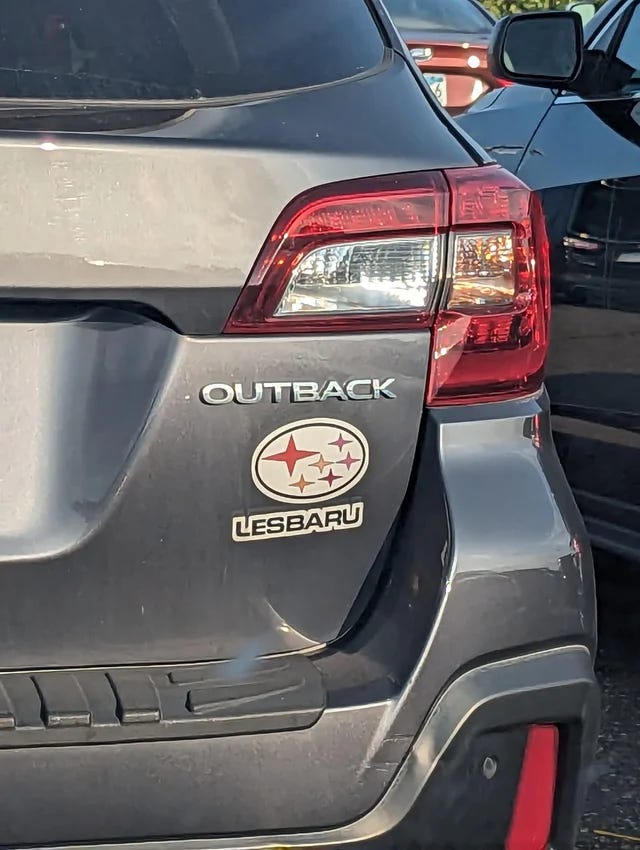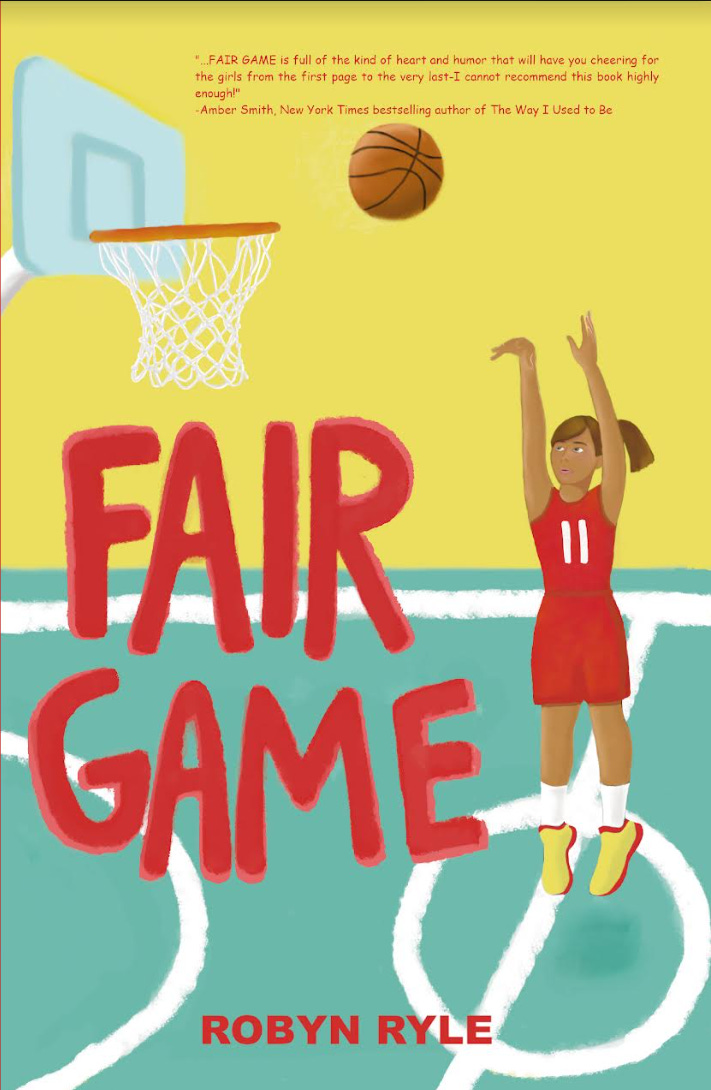My Subaru Outback did not make me happy
What is the point of a college degree, anyway?
I was in my thirties before I bought my first car. I’d just made the daring move from a full-time, tenure-track job at a college in Alabama to a job closer to home. It felt sort of insane, this move. A full-time, tenure-track job was the golden egg, but I didn’t like the department and I didn’t want to spend the rest of my life seven hours away from my family. So I made the leap and found myself back in Indiana.
New job, why not a new car? I bought a Subaru Outback because all the coolest lesbians drove them and who doesn’t want to be like the cool lesbians? I remember distinctly how excited I was to be buying a new car. It felt life-changing. Perhaps some part of me felt this would be the move that would finally make me a grown-up. Or a lesbian. Either way, I was pretty amped about that car.
I might have had to wait for the exact color and model to come in, I can’t remember, but there was a period of waiting, of Christmas-morning type levels of anticipation and excitement. What I remember next is driving my new car to the Wal-Mart, which was depressing enough. The new car hadn’t changed the fact that I lived in the middle of rural Indiana. It hadn’t changed anything about the experience of shopping in a Wal-Mart in rural Indiana. The new car had, in fact, not changed anything at all. I was still me. I was still in the same job. I was still sitting in the parking lot of a Wal-Mart.
This is the story I think of when I ask my students why they’re in college and get the inevitable answer—so they can get a good job.
What’s a good job? I ask next.
One that makes enough money, the students say.
What’s enough money? I ask. I’m super-annoying with all my questions.
Enough money is enough to live a good life.
What’s a good life? I ask. Is it the ability to buy a new Subaru Outback? Because trust me from personal experience, that car will not bring you happiness.
I thought of that car recently after reading about Goodhart’s Law on
Substack . Goodhart’s Law says, “Any measure that becomes a target ceases to be a good measure.” If, for example, U.S. News and World Report is trying to measure what makes a college or university “good,” and that measure becomes a target to be achieved for colleges and universities, it’s no longer measuring anything. Colleges and universities game the system. To raise the average SAT score of their student body, Baylor University paid students to re-take the test. Other institutions offer a lot of classes capped at 19 so they’re technically under the 20-student cutoff that U.S. News and World Report uses.Once you look for it, Goodhart’s Law is everywhere. Grades are a classic example. They’re supposed to be a measure of learning, but they’re also very much a target students set for themselves. Let the gaming of the system in order to reach that target begin! Sadly, a fair number of students spend much more time trying to get an A than they do trying to actually learn. Goodhart’s Law helps to understand that it’s not the students’ fault. The system encourages them to pursue the target—the holy grail of GPA.
I’ll admit I’d never heard of Goodhart’s Law before I read that post. In sociology we’re more likely to call the same phenomenon rationalization. Rationalization is when everything in our lives becomes increasingly ruled by methodical procedures and calculable rules. We become obsessed with measuring everything and following the exact right procedures in order to achieve the desired outcome. It doesn’t sound so bad except for the added part that in rationalization, we have no idea anymore why we’re pursuing the desired outcome in the first place. This is the iron cage part of rationalization, as Max Weber articulate it.
Students want that A so that they can get into grad school. They want into grad school so they can get that good job. They want that good job so that they can eventually buy a Subaru Outback and find themselves facing an existential crisis in the parking lot of a rural Indiana Wal-Mart.
Assessment in higher education is a perfect example of both Goodhart’s Law and rationalization. Assessment exists to make sure that colleges and universities are doing what they’re supposed to be doing. Obviously, there’s a lot of debate about what it is exactly that colleges and universities are supposed to be doing in the first place, but let’s start with a good, capitalist measure of success—do college graduates make more money?
Yes. The salaries of college graduates are 84% higher than high school graduates on average. College graduates on average make 1.2 million more over the course of their lives. They’re also half as likely to be unemployed as high school graduates.
There are variations here, but they have very little to do with what’s happening on college campuses. A college degree carries less economic punch for Black women, but that’s mostly about student debt and racism. Colleges and universities absolutely need to do better by their Black students and Indigenous students and students of color and queer students. But this is not the problem assessment concerns itself with. I wish it was. If assessment was about helping to restructure higher education to be less racist, sexist, homophobic, transphobic, ableist, classist, etc., I’d be all behind it.
Note that this financial measure of the success of higher education doesn’t seem to have much to do with actual learning. I mean, maybe you could argue that the more you learned in college, the more you’ll make when you graduate. But every single one of us who has actually worked a job in the real world has pretty quickly been disabused of the notion that it’s stellar knowledge of Classical Greece or calculus that leads to making more money. In the real world, there’s very little correlation between knowledge or even intelligence and income, because, as I might have said before, the world is not a meritocracy. The smartest and most knowledgeable people do not make the most money.
The ascendency of assessment in higher education is definitely annoying in that as a professor, you now have to spend a lot of time trying to prove that you’re doing what you say you’re doing, rather than actually figuring out how to do a better job. The two things, no matter what the assessment cult tells you, are not the same. I’m constantly thinking about how to make my classes better. I’m not exaggerating. I’m thinking about is as I fall asleep at night. In the shower. On my walk. I spend a lot of time thinking about what’s working in my classes and what isn’t and this is coming from someone who is fairly checked out and over it. None of that thinking counts as assessment.
But more than being an annoying extra task that gets in the way of my actual job, assessment is dangerous precisely because of what Goodhart’s Law teaches us. When a measure becomes a target, bad things happen. If the point of a college education is just to make more money, what the fuck is the point of learning Ancient Greek, which I did as an undergrad and loved every moment of? If the point of a college education is to make more money, so much of what I do is just…pointless. There’s no point in thinking about classic questions of agency versus structure. No point in spending a semester unpacking social categories like gender or social class. I can literally see these thoughts in my students heads as I’m teaching some days—“Why is she making me think about these things? How is this going to help me make six figures? Is there a Subaru Outback in my future or not?”
I believe that all the things I’m making them think and read about in my sociology classes will actually be helpful to them in their future jobs. I believe it because our alum tell me that this is so.
I also know that some of the value of what they’ll learn in my sociology courses isn’t measurable in extra income or employability. Some of the value of what happens in a good college classroom isn’t measurable at all. It’s that moment when someone’s mind is blown and a whole new perspective on the world opens up for them. It’s the sense of community that develops in a really good class, the camaraderie and intimacy of using the experiences of our own lives as a textbook. It’s laughter and awkwardness and inside jokes. It’s a thought from a reading or a lecture that stays with you for the rest of your life.
It's sacred, which is something I learned during the pandemic. When we got sent home and tried to approximate some version of the classroom online, I realized how sacred what we’re doing is. We sit together. In a physical space. We give up those valuable minutes and hours of our lives. We trust each other with our stories. We learn.
Will it get you a Subaru Outback in the end? I have no idea. Will it help you with that moment of existential crisis in the Wal-Mart parking lot that is inevitably coming for us all? Yeah, I think so. And that’s not nothing.
I know it’s early, but if you’re within driving distance, come to the Louisville Book Festival this weekend and get some of your holiday shopping done. It’s Friday and Saturday, 10-6, at the Kentucky International Exposition Center. I’ll have copies of all my books to sign and I’ll be giving a talk at 12:00 on Saturday.
Saturday, I’ll head up I-65 to the launch for Playing Authors: An Anthology at Tomorrow Bookstore. I’ve read the whole anthology and it is awesome. Get your copy and stop by and meet all the amazing authors.
As always, you can buy my book at the link below, but if you’d like a signed copy, I have some I’ll be selling for the holidays. Contact me here or just reply to this e-mail if you’re interested.









Lesbaru? Who knew?! I wonder what other marques are favoured by different groups? Might be fun to make a list. Won't make you happy - but it might be amusing. Thanks for your writing.
Yes! It’s the unmeasurable gains from college that helped me in my various employments. While reading Jane Austen wasn’t helpful in my work in public health statistics, our class discussions of manners and class helped me be more observant and sensitive to the different people I worked with. The group assignments in my social work classes (which I hated) definitely taught me how to cope when working with difficult people. And studying literature from other countries helped me be more receptive to the first- and second-generation immigrants I worked with. That said, we sometimes talk about getting a Subaru Outback although we’d prefer a Forester 😉